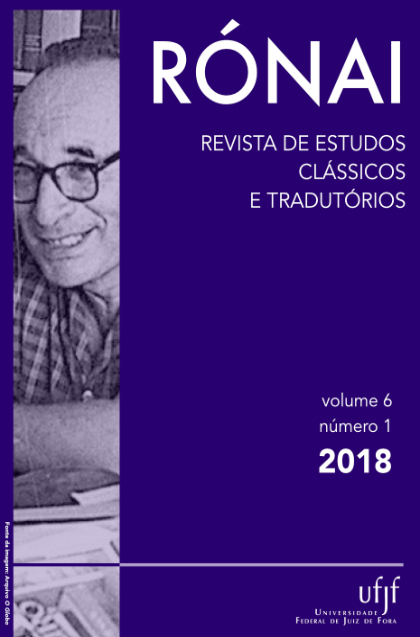Pítica 1 de Píndaro
DOI:
https://doi.org/10.34019/2318-3446.2018.v6.23262Palavras-chave:
Sicília, epinício, Píndaro, tirania, Hierão de SiracusaResumo
Apresenta-se uma tradução para o português da Pítica 1 de Píndaro, realizada com base no texto grego editado por Snell e Mahler (1980), acompanhada de uma pequena introdução e notas.
Downloads
Referências
BOWRA, C. M. (Ed.). Pindari carmina: cum fragmentis. 2ª ed. Oxford: Clarendon Press, 1965. (Scriptorum Classicorum Bibliotheca Oxoniensis).
CABRAL, L.A.M. Hino Homérico a Apolo: Introdução, tradução, comentários e notas. Cotia: Ateliê Editorial, 2004.
CURRIE, B. Pindar and the cult of heroes. Oxford: Oxford University Press, 2005.
DIODORO SÍCULO. The Library of History. Tradução de C.H. Oldfather. Cambridge, MA/Londres, 1989. v. 4. (The Loeb Classical Library).
DOUGHERTY, C. The poetics of colonization: from city to text in archaic Greece. Oxford: Oxford University Press, 1993.
______. Archaic Greek Foundation Poetry: Questions of Genre and Occasion. The Journal of Hellenic Studies, Cambridge: Society for the Promotion of Hellenic Studies/Cambridge University Press, v. 114, pp. 35-46, 1994.
GENTILI, B. (Ed.). Pindaro: Le Pitiche. Colaboração de Ettore Cingano, Paola Angeli Bernardini e Pietro Giannini. 4ª ed. Roma: Fondazione Lorenzo Valla/Arnaldo Mondadori Editore, 2006. (Pindaro: Le Odi, 2).
HARRELL, S. King or private citizen: fifth-century sicilian tyrants at Olympia and Delphi. Mnemosyne, Leiden: Brill, v. 55, n. 4, pp. 439-464, 2002.
______. Synchroniciy: The Local and the Panhellenic Within Sicilian Tyranny. In: LEWIS, S. (Ed.). Ancient tyranny. Edimburgo: Edinburgh University Press: 2006.
HERÓDOTO. The Histories. Tradução de Robin Waterfield, introdução e notas Carolyn Dewald. Oxford: Oxford University Press, 2008.
HESÍODO. Teogonia. Organização e tradução de Christian Werner. São Paulo: Hedra, 2013.
HIRATA, E. F. V. As odes de Píndaro e as tiranias siciliotas. Classica. São Paulo: Sociedade Brasilera de Estudos Clássicos, v.9/10, n. 9/10, pp. 61-72, 1996/1997.
______. Monumentalidade e representações do poder de uma pólis colonial. In: FLORENZANO, M. B. B.; HIRATA, E.F.V. (Org.). Estudos sobre a cidade antiga. São Paulo: Edusp/Fapesp, 2009. p. 121-136.
KOWALZIG, B. Nothing to do with Demeter? Something to do with Sicily! Theatre and society in the early fifth-century west. In: REVERMANN, M.; WILSON, P. (Org.). Performance, iconography, reception: studies in honour of Oliver Taplin. Oxford: Oxford University Press, 2008. p. 128-60.
KURKE, L. The traffic in praise: Pindar and the poetics of social economy. Ithaca: Cornell University Press, 1991. (Myth and Poetics).
KRUMMEN, E. Cult, myth, and occasion in Pindar’s victory odes: a study of Isthmian 4, Pythian 5, Olympian 1, and Olympian 3. Tradução de J.G. Howie: Prenton: Francis Cairns, 2014.
LAKY, L. A. A apropriação e consolidação do culto de Zeus pela cidade grega: moedas e santuários, política e identidade em época arcaica e clássica. 2016. Tese (Doutorado em Arqueologia) – Museu de Arqueologia e Etnologia, Universidade de São Paulo, São Paulo, 2016.
LOBEL, E. (Ed.). The Oxyrhynchus Papyri: Part 26. Londres: Egypt Exploration Society, 1961 (Graeco-Roman Memoirs).
MAHLER, H. (Ed.). Bacchylides: Carmina cum fragmentis. 11ª ed. Munique e Leipzig: De Gruyter, 2003. (Bibliotheca Scriptorum Graecorum et Romanorum Teubneriana).
MASLOV, B. Pindar and the emergence of literature. Cambridge: Cambridge University Press, 2015.
MEIGGS, R.; LEWIS, D. M. Selection of greek historical inscriptions to the end of the fifth century BC. Oxford: Clarendon Press, 1969.
MORGAN, K. A. (Ed.). Popular tyranny. Austin: University of Texas Press, 2003. (Sovereignty and itd discontents in Ancient Greece).
______. Pindar and the construction of syracusan monarchy in the fifth century B.C. Oxford: Oxford University Press, 2015. (Greeks Overseas).
MORRISON, A. D. Performances and audiences in Pindar‘s sicilian victory odes. Londres: Institute of Classical Studies, 2007.
MURRAY, J.T. (Ed.). Homer: Odyssey. Cambridge/Londres: Harvard University Press, 1919. (The Loeb Classical Library).
______. Homer: Iliad. Cambridge/Londres: Harvard University Press, 1924. (The Loeb Classical Library).
NAGY, G. Pindar’s Homer: the lyric possession of an epic past. Baltimore/Londres: Johns Hopkins University Press, 1990.
RAAFLAUB, K. Stick and glue: the function of tyranny in fifth-century athenian democracy In: MORGAN, K.A. (Ed.). Popular tyranny. Austin: University of Texas Press, 2003. (Sovereignty and itd discontents in Ancient Greece).
RACE, W. H. (Ed.). Pindar I: Olympian odes; Pythian odes. 2ª ed. Cambridge, MA/Londres: 2012. v. 1. (The Loeb Classical Library).
SNELL, B.; MAHLER, H. (Ed) Pindari carmina cum fragmentis. Leipzig: BSB B.G. Teubner Verlagsgesellschaft, 1980. 2 v. (Bibliotheca Scriptorum Graecorum et Romanorum Teubneriana).
YOUNG, D.C. Pythians 2 and 3: Inscriptional ποτέ and the “Poetic Epistle”.Harvard Studies in Classical Philology. Cambridge: Department of the Classics, Harvard University, v. 87, pp.31-48, 1983.
WATKINS, C. How to kill a dragon: aspects of indo-european poetics. New York: Oxford University Press, 1995.
WILLCOCK, M. M. On first reading Pindar: the fifth Isthmian. Greece & Rome. Cambridge: The Classical Association/Cambridge University Press.v. 25, n. 1, pp. 37-45, 1978.
Downloads
Publicado
Como Citar
Edição
Seção
Licença
Copyright (c) 2018 Ricardo Tieri de Brito, Christian Werner

Este trabalho está licenciado sob uma licença Creative Commons Attribution 4.0 International License.
Direitos Autorais
Autores que publicam nesta revista concordam com os seguintes termos:
1. Autores e autoras mantém os direitos autorais e concedem à revista o direito de primeira publicação, sendo a publicação licenciada sob a Creative Commons Attribution License 4.0 Internacional.
2. Os autores e autoras têm permissão e são estimulados(as) a publicar e compartilhar o trabalho com reconhecimento da publicação inicial nesta revista.
3. Os autores e autoras dos trabalhos aprovados autorizam a revista a ceder o conteúdo de seus trabalhos, após sua publicação, para reprodução em indexadores de conteúdo, bibliotecas virtuais e similares.
Para mais informações sobre a Creative Commons Attribution 4.0 International License, acessar: https://creativecommons.org/licenses/by/4.0/
Isenção editorial
O conteúdo dos artigos publicados é de inteira e exclusiva responsabilidade de seus autores, não representando a posição oficial da Rónai - Revista de Estudos Clássicos e Literários ou do Faculdade de Letras da Universidade Federal de Juiz de Fora ou das instituições parceiras.



